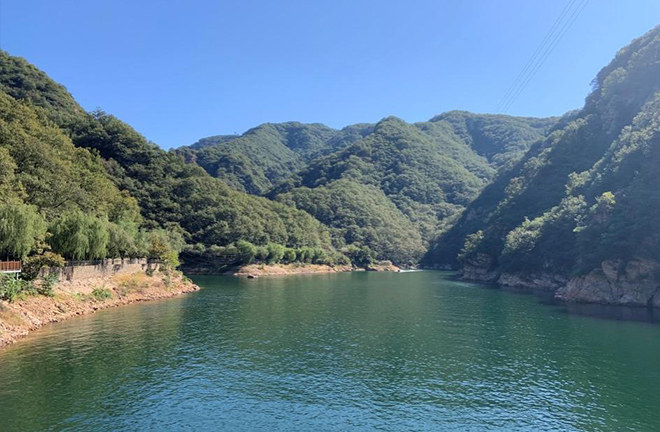Seminar presents historical changes in Chinese society

A green scene at the Jingdong Grand Canyon in Beijing’s suburb Photo: Yang Lanlan/CSST
On August 10–11, the 19th Annual Meeting of the Association for Chinese Social History (ACSH) was held in Qingdao, Shandong Province. Nearly 100 scholars in attendance exchanged views on the theme of “Ecological Environment, Social Changes, and Institutional Culture in Chinese History.”
Review of social history
After the reform and opening up, the rise of Chinese social historiography marked a significant shift towards a more “open” approach in historical scholarship. In October 1986, the First Symposium on Chinese Social History took place in Tianjin, signaling a growing academic focus on people’s social lives. This event broadened the horizons of traditional historical research, which had traditionally emphasized political history. Over the past two decades, social historiography has become an important academic force within the “new history” movement in China.
In addition to expanding its research scope, the “openness” of Chinese social history is also reflected in the exploration of diverse historical sources and the incorporation of theories and methods from various disciplines such as sociology, anthropology, demography, law, and geography. This interdisciplinary approach has spawned new research areas, including the social history of medicine, law, and art, as well as environmental history. According to Wu Qi, a professor from the School of History and Culture at Central China Normal University, Chinese social history has absorbed interdisciplinary approaches and favors case and regional studies, a trend that has affected the broader aims of historical scholarship.
Zhang Junfeng, a professor from the Research Center for Chinese Social History at Shanxi University, believes that since the beginning of the 21st century, the primary research paradigm in Chinese social history has shifted from a focus on holistic social history to regional social history, and is now moving toward a “new synthesis.” Key issues at the forefront of social history today—such as how to interpret national history from the perspective of local societies, how to better explore folk culture, how to progress from regional to cross-regional studies, and how to integrate political history with social history—have become central concerns within the historical community.
With the development of Chinese social history, the initially refreshing research interests and methods have also incurred criticism. Some scholars contend that many studies have fallen into the mire of “fragmentation” driven by the compulsion to collect data on the historical trinity of “temples, steles, and village genealogies.” ACSH President Chang Jianhua argued that individual cases or regional studies should not be considered “fragments” if they are viewed as parts of a larger whole. The integration of social structures and social life is an intrinsic requirement of contemporary social history research, and it is necessary to balance this relationship.
Zhang Kan, dean of the School of History and Cultural Heritage at Xiamen University, stressed the necessity of a global comparative perspective for the study of regional social history.
Tang Shichun, a research fellow from the Institute of Modern History at the Chinese Academy of Social Sciences, called for efforts to transcend rigid chronological barriers in Chinese social history research. He advocates for the integration of studies on modern Chinese history with those on the history of the PRC, affirming both the distinct phases and the continuity of history.
Addressing the limitations of using examples to support arguments in social history research, Huang Guoxin, a professor from the Center for Historical Anthropology at Sun Yat-sen University, recommended supplementing them with appropriate statistical methods for trend analysis to portray a more complete picture.
Ecological civilization
Ecological civilization is of profound significance in contemporary society, and the relationships between humans and the earth, as well as between ecology and regional societies, have become key research topics in recent historical research. Chang pointed out that the annual meeting placed special emphasis on the ecological environment in China’s history, associating it with themes of social change and institutional culture. Scholars are striving to create a new synthesis between eco-environmental issues with social history. In Zhang Junfeng’s view, this trend demonstrates the academic sensitivity of Chinese social history, implying that the field is shifting from a “human-centered” to a “human and all things-centered” paradigm.
Liang Hongsheng, a professor from the School of History, Culture and Tourism at Jiangxi Normal University, conducted a study on the development of a specific fishing technique in the lake regions of Jiangxi Province. His research shed light on transformations in both fishing practices and the identities of fishermen under certain historical conditions.
Zhu Xiaotian, a professor from the School of Sociology at Soochow University, investigated the survival environment of local opera in Jiangnan [regions south of the lower reaches of the Yangtze River] from the perspective of cultural ecology, exploring the long-term interaction between the cultural practices of specific ethnic groups and the natural ecosystem in which they live.
In recent years, many scholars who have long been engaged in the modern social history of regional water conservancy have turned their attention to water conservancy and agricultural environmental governance in the period following the founding of the PRC in 1949. Based on newly discovered archival materials from Yanbei [regions north of Yanmen Pass] after 1949, Zhang Junfeng elaborated on the process of discontinuing and restoring local salt production on saline-alkali soil after the establishment of the PRC, systematically exploring the tensions and mutual adaptation between economic development and individual livelihoods in a specific ecological environment.
Yao Fei, a professor from the School of Humanities at Shanghai Normal University, examined the driving roles of health policies, scientific research, and public movements in the prevention and treatment of major diseases after 1949.
The conference was sponsored by the ACSH and hosted by the School of History at Qingdao University.
Edited by YANG LANLAN
